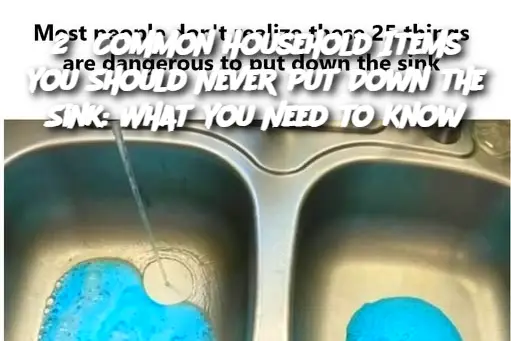Grease and Oil
When grease or oil goes down the sink, it can harden and solidify inside the pipes, causing blockages that can result in expensive plumbing repairs.
Coffee Grounds
Although coffee grounds seem harmless, they can clump together and create a dense sludge that blocks your pipes over time.
Eggshells
Eggshells can cause clogs by creating a gritty paste when mixed with other substances like grease or soap.
Flour or Dough
When mixed with water, flour and dough create a sticky paste that can quickly harden and clog your pipes.
Paint
Paint contains harmful chemicals that can contaminate water sources and harm the environment. It also hardens in pipes, causing potential blockages.
Hair
Hair is a common culprit in bathroom drains, and it can easily form thick clogs when combined with soap scum or other residues.
Medications
Flushing medications down the sink can lead to toxic chemicals leaching into groundwater and potentially harming wildlife and the environment.
Fats from Meat
Like grease, fats from meat can solidify in pipes and cause significant blockages.
Cigarette Butts
Cigarette butts are made of materials that don’t break down easily and can lead to pipe clogs.
Petroleum Products
Items like gasoline, oil, or motor fluids should never go down the sink, as they can contaminate water supplies and damage plumbing.
Wet Wipes
While they may seem flushable, wet wipes do not break down and often cause major clogs in both household pipes and city sewage systems.
Cotton Balls and Swabs
These items can easily clog pipes because they don’t dissolve in water and can cause obstructions when combined with hair or other debris.
Chewing Gum
Gum can stick to pipes and solidify, leading to clogs. It should always be disposed of in the trash.
Pasta
Pasta expands when it comes into contact with water, and putting it down the sink can quickly create a clog as it absorbs water and swells.
Rice
Like pasta, rice absorbs water and expands, causing blockages if it’s disposed of in the sink.
Nuts and Seeds
These items can get stuck in pipes, creating a blockage that is difficult to clear.
Fruit and Vegetable Peels
Fibrous peels can accumulate in your pipes, leading to clogs that block water flow.
Tissues and Paper Towels
These products do not break down like toilet paper, and they can cause serious blockages in both your sink and sewer system.
Cleaning Products (Chemical-Based)
Harsh chemical cleaners can damage your plumbing and pollute water supplies, so they should never be flushed down the drain.
Nail Polish and Remover
Nail polish and remover contain chemicals that can damage plumbing and pollute water sources.
Dental Floss
Dental floss is made from synthetic materials that do not break down in water, and it can easily get caught in pipes, leading to blockages.
Paint Thinner
Like paint, paint thinner is harmful to both the environment and your plumbing. It can cause corrosion in pipes and should be disposed of properly.
Plaster and Spackling
These substances can solidify in pipes, causing severe clogs and damage to your plumbing system.
Bathroom Products (Soaps and Shampoos)
While soap and shampoo seem safe, they can combine with other residues like hair to form thick, clogging substances in pipes.
Toxic Chemicals
Many household chemicals, such as bleach and drain cleaners, can damage pipes or pollute water supplies. Always follow disposal instructions for these products.
Tips for Serving and Storing:
Proper Disposal: Always dispose of non-degradable materials like wet wipes, cotton swabs, or tissues in the trash, not down the sink.
Use a Drain Strainer: Consider using a drain strainer or catcher to prevent food scraps, hair, and other debris from going down your sink.
Compostable Scraps: For organic waste like fruit peels and vegetable scraps, consider composting them instead of sending them down the drain.
Chemical-Free Cleaning: Use non-toxic cleaning solutions whenever possible to avoid polluting the water supply.
Variants:
Eco-Friendly Drain Cleaners: Use natural products like baking soda and vinegar to clean your drain instead of chemical cleaners. These substances are effective and won’t damage your plumbing or harm the environment.
Recycling Options for Paint: Check with your local waste disposal center for recycling options for leftover paint and paint thinners.
Composting Alternatives for Food Scraps: Set up a small composting system at home to dispose of food scraps like fruit peels and vegetable waste, which can clog drains.
FAQ:
What happens if I put grease down the sink?
Grease can solidify in your pipes and cause a severe clog. It can also lead to build-up, which will require expensive plumbing repairs to fix.
Can I flush medications down the sink?
No. Medications should never be flushed down the sink or toilet, as they can contaminate water sources and harm the environment. Dispose of them according to local hazardous waste disposal guidelines.
What should I do if something gets stuck in my sink drain?
If something gets stuck, avoid using harsh chemicals to clear the clog. Instead, use a plunger, or try a mixture of baking soda and vinegar to dislodge the blockage. If the clog persists, call a professional plumber.
Is there an eco-friendly way to dispose of paints or chemicals?
Yes, many local communities offer special collection events or drop-off locations for hazardous household waste, including paints and chemicals.
How can I prevent future sink clogs?
To prevent clogs, use drain catchers to capture food scraps and hair, never put oils or grease down the sink, and be mindful of what goes down your drains.
Conclusion:
It’s easy to overlook what goes down the sink, but improper disposal of everyday items can lead to significant plumbing issues and environmental harm. By being mindful of what we put down our drains and choosing the proper disposal methods for items like grease, chemicals, and food waste, we can prevent clogs and protect both our plumbing systems and the planet. Keep this list in mind to ensure your sink and pipes remain in tip-top shape!
ADVERTISEMENT

